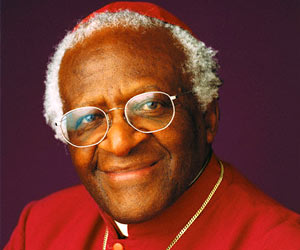Tutu, Desmond Mpilo
1931–
South African religious leader and activist
Aleader of the Anglican Church, Desmond Mpilo Tutu is best known for his tireless efforts for peace, unity, and human rights in SOUTH AFRICA. Born in Klerksdorp, he hoped to become a doctor but could not afford medical training. Instead, he became a schoolteacher and attended the University of South Africa. After graduating in 1958 he suffered a serious illness and decided to become a priest of the Anglican Church. He studied for three years in England, then taught theology at various universities throughout southern Africa. In 1972 he returned to England to work for the World Council of Churches.

When Tutu came back to South Africa three years later, he quickly became an important figure in both the religious and the political world. In the church he rose to positions never before held by a black person, including dean of St. Mary's Cathedral in Johannesburg and bishop of LESOTHO. While serving as the general secretary of the South African Council of Churches in the late 1970s, Tutu spoke out strongly against apartheid. He encouraged South Africans to stage nonviolent protests and urged foreign nations to apply economic pressure to South Africa's racist government. He won the Nobel Peace Prize for those efforts in 1984. In 1986 Tutu became archbishop of Cape Town, the head of South Africa's Anglican church—a role he held for ten years. As apartheid came to an end in the early 1990s, Tutu played a major role in bringing peace and unity to the long-divided nation. He worked together with Nelson MANDELA, the nation's first black president, who in 1996 named Tutu chairperson of the Commission on Truth and Reconciliation.